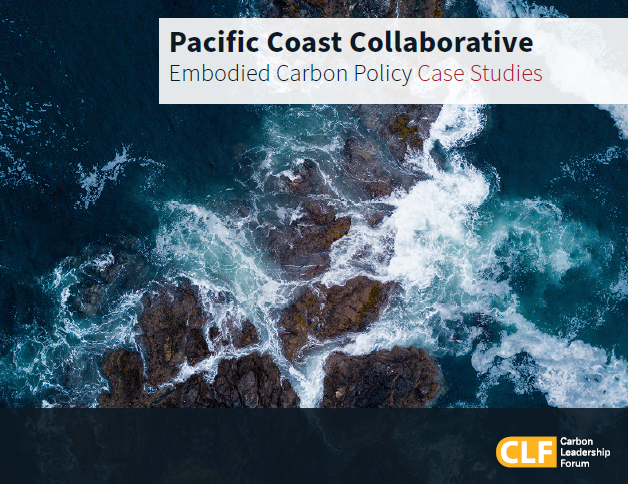The Carbon Leadership Forum released a new report highlighting ten case studies of policies driving lower carbon construction across the Pacific Coast. Each case explores the development process, challenges faced, and lessons learned through the policy process.
CLF gathered information for the report from members of the Pacific Coast Collaborative, a region-wide collaboration of state, regional, and municipal governments. The Pacific Coast of North America represents the world’s fifth-largest economy, a thriving region of 55 million people with a combined GDP of $3 trillion. Through the Pacific Coast Collaborative, British Columbia, Washington, Oregon, California, and the cities of Vancouver, Seattle, Portland, San Francisco, Oakland, and Los Angeles are working together to build the low carbon economy of the future. Members share ambitious goals for reducing greenhouse gas emissions at least 80 percent by 2050, and back up commitments with regional action to transform power grids, transportation systems, buildings, and economies while increase resilience to a changing climate.
These case studies showcase the region’s policy leadership on low-carbon construction and provide insights to inform other jurisdictions pursuing legislation and other policies within the Pacific Coast region and beyond.
The PCC Low Carbon Construction Task Force, launched at COP26 in November 2021, is a initiative to advance low-carbon materials and methods in building and construction projects. The Task Force aims to create a shared regional strategy with the goal of accelerating innovation, investment, and market development for low carbon materials by leveraging the scale of the Pacific Coast regional economy. The Carbon Leadership Forum began supporting the taskforce as a technical resource in 2022.
By connecting jurisdictions at the regional level — and connecting states and provinces with cities in the region — the PCC facilitates collaboration on issues that cross borders and jurisdictional boundaries, such as grid integration, a comprehensive electric vehicle charging network, and responding to ocean acidification. The PCC pools policy and technical expertise, shares strategies to curb greenhouse gas emissions while growing the economy, and works together to implement them.
Information for the case studies was gathered from interviews with PCC members who were involved in the policy, publicly available policy reports, as well as interviews from the implementing agency of the policy.
Authors of the report and members of the research team from the Carbon Leadership Forum included Megan Kalsman (Policy Researcher), Meghan Lewis (Senior Researcher), and Kate Simonen (Executive Director.) The research was funded by the ClimateWorks Foundation, and graphic design was provided by Hannah Adams.
